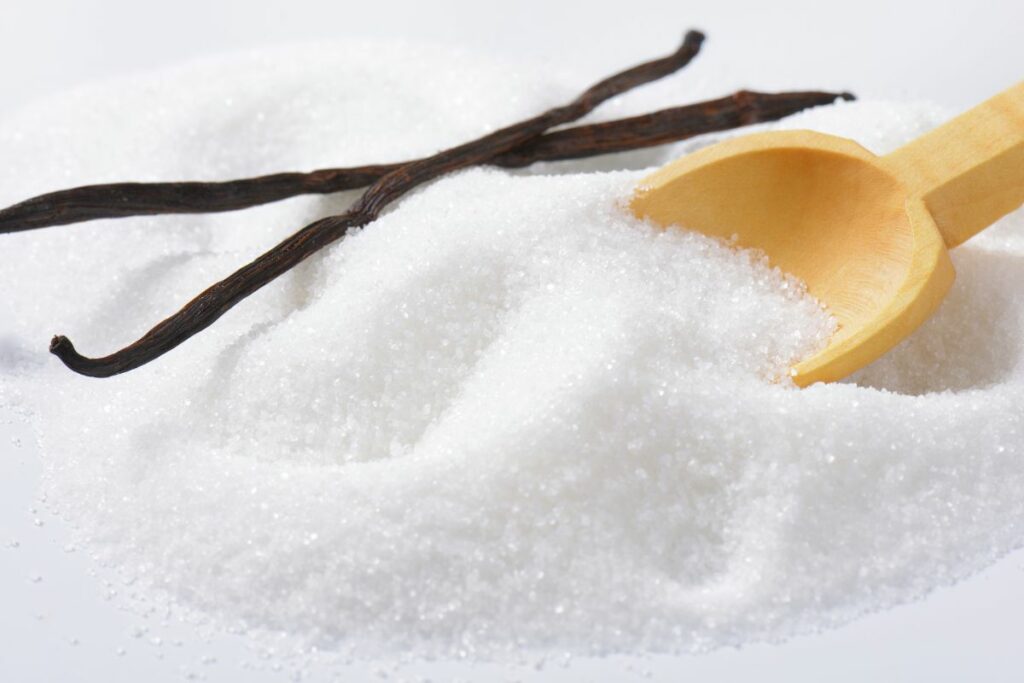Vanilla sugar is a popular ingredient in many baked goods and desserts. It adds a sweet and fragrant vanilla flavor that is hard to replicate with other ingredients. However, for those who cannot consume sugar or prefer to avoid it, finding a suitable substitute for vanilla sugar can be a challenge.
Fortunately, there are several alternatives to vanilla sugar that can be used in baking and cooking. Some of the most common substitutes include vanilla extract, vanilla powder, vanilla syrup, brown sugar, and maple syrup. Each of these alternatives has its own unique flavor profile and can be used in different ways depending on the recipe. By experimenting with these substitutes, it is possible to create delicious desserts and baked goods without using traditional vanilla sugar.
While vanilla sugar substitutes can be a great option for those who cannot consume sugar, it is important to keep in mind that they may not always produce the same results as traditional vanilla sugar. In some cases, the texture or flavor of the final product may be slightly different. However, with a bit of experimentation and creativity, it is possible to create delicious desserts and baked goods using these substitutes.

Contents
- 1 Understanding Vanilla Sugar
- 2 Why Substitute Vanilla Sugar
- 3 Types of Vanilla Sugar Substitutes
- 4 Sugar-Based Substitutes
- 5 Natural Sweeteners as Substitutes
- 6 Artificial Sweeteners as Substitutes
- 7 How to Use Vanilla Sugar Substitutes
- 8 Effects on Taste and Texture
- 9 Making Your Own Vanilla Sugar Substitute
- 10 Other Uses of Vanilla Sugar Substitutes
Understanding Vanilla Sugar
Vanilla sugar is a type of sugar that has been infused with vanilla flavor. It is commonly used in baking and cooking to add a rich vanilla flavor to desserts, pastries, and beverages. Vanilla sugar can be made by mixing sugar with vanilla beans or by adding vanilla extract to sugar.
Vanilla beans are the seed pods of the vanilla orchid. They are native to Mexico and are now grown in many tropical regions around the world, including Madagascar, Tahiti, and Indonesia. Vanilla beans are harvested by hand and then cured and dried to develop their characteristic flavor and aroma.
In Europe, vanilla sugar is a popular ingredient in many baked goods, particularly in Austria and Germany. It is often used in recipes for cakes, cookies, and pastries, where it adds a subtle sweetness and a rich vanilla flavor. Vanilla sugar is also used to flavor hot beverages such as coffee and tea.
To make vanilla sugar at home, simply split a vanilla bean lengthwise and scrape out the seeds. Mix the seeds with sugar and store the mixture in an airtight container for several days to allow the flavors to meld. Alternatively, you can add a few drops of vanilla extract to sugar and mix well.
Overall, vanilla sugar is a versatile and delicious ingredient that can add a touch of luxury to any recipe. Whether you choose to make your own or purchase it from a specialty food store, vanilla sugar is sure to impress your guests and elevate your baking and cooking to the next level.
Why Substitute Vanilla Sugar
Vanilla sugar is a popular ingredient in many recipes, but sometimes it may not be available or suitable for certain dietary needs. In such cases, a vanilla sugar substitute can be used. Here are a few reasons why someone might choose to substitute vanilla sugar:
Dietary Restrictions
Vanilla sugar is made by combining sugar with vanilla beans, which adds a unique flavor and aroma to the sugar. However, some people may need to avoid sugar due to dietary restrictions or health concerns. For example, people with diabetes may need to limit their sugar intake to manage their blood sugar levels. In such cases, a sugar substitute can be used instead of vanilla sugar.
Calorie Content
Vanilla sugar is a source of empty calories, which means it provides calories but no essential nutrients. One teaspoon of vanilla sugar contains about 16 calories. Over time, consuming too many empty calories can contribute to weight gain and other health problems. Using a sugar substitute instead of vanilla sugar can help reduce calorie intake.
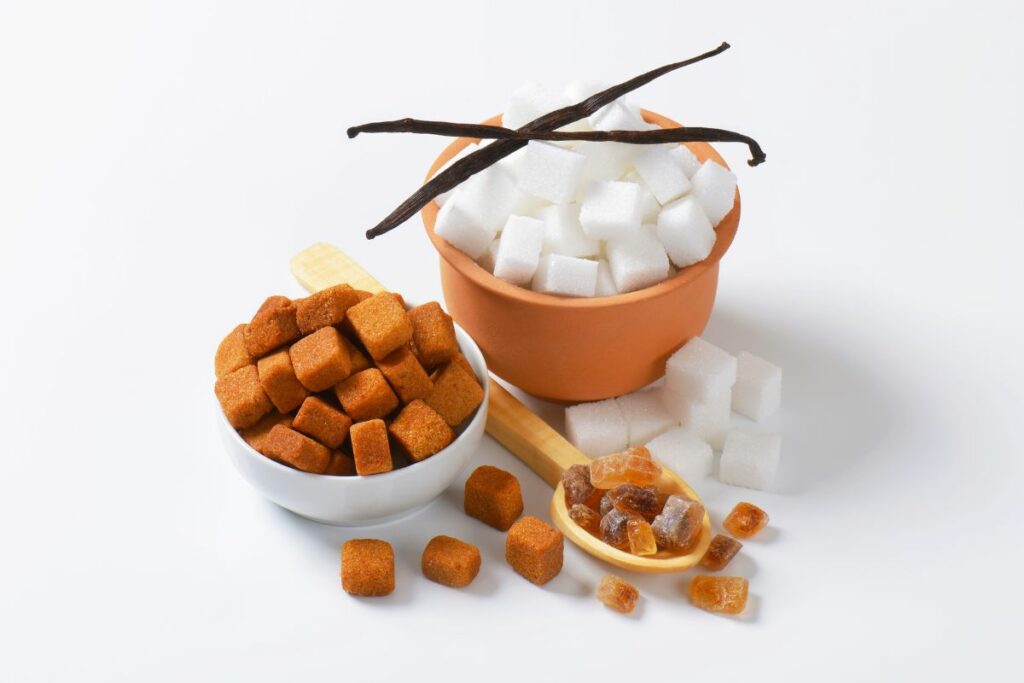
Health Benefits
Using a sugar substitute instead of vanilla sugar can provide some health benefits. For example, some sugar substitutes are low in calories and do not raise blood sugar levels, making them suitable for people with diabetes or those trying to lose weight. Additionally, some sugar substitutes are made from natural sources and may provide additional health benefits, such as antioxidants or vitamins.
In summary, there are several reasons why someone might choose to substitute vanilla sugar. Whether it is for dietary restrictions, calorie content, or health benefits, there are many vanilla sugar substitutes available that can provide a similar flavor and aroma to vanilla sugar.
Types of Vanilla Sugar Substitutes
There are several types of vanilla sugar substitutes that can be used in place of vanilla sugar. These substitutes include vanilla extract, vanilla syrup, vanilla powder, vanilla flavoring, vanilla bean paste, homemade vanilla sugar, and powdered vanilla sugar.
Vanilla Extract
Vanilla extract is a common substitute for vanilla sugar. It is made by soaking vanilla beans in alcohol and is a concentrated form of vanilla flavor. When using vanilla extract as a substitute for vanilla sugar, it is important to note that it is much stronger in flavor than vanilla sugar. Therefore, it is recommended to use only a small amount of vanilla extract when substituting it for vanilla sugar.
Vanilla Syrup
Vanilla syrup is another popular substitute for vanilla sugar. It is made by combining sugar, water, and vanilla extract and is commonly used in coffee shops and cafes. When using vanilla syrup as a substitute for vanilla sugar, it is important to note that it is much sweeter than vanilla sugar. Therefore, it is recommended to use only a small amount of vanilla syrup when substituting it for vanilla sugar.
Vanilla Powder
Vanilla powder is a dry form of vanilla flavoring that is made by grinding vanilla beans into a fine powder. It is a popular substitute for vanilla sugar because it is easy to use and has a long shelf life. When using vanilla powder as a substitute for vanilla sugar, it is important to note that it is much stronger in flavor than vanilla sugar. Therefore, it is recommended to use only a small amount of vanilla powder when substituting it for vanilla sugar.

Vanilla Flavoring
Vanilla flavoring is a liquid form of vanilla flavor that is commonly used in baking. It is made by combining artificial or natural vanilla flavor with water or alcohol. When using vanilla flavoring as a substitute for vanilla sugar, it is important to note that it is much stronger in flavor than vanilla sugar. Therefore, it is recommended to use only a small amount of vanilla flavoring when substituting it for vanilla sugar.
Vanilla Bean Paste
Vanilla bean paste is a thick and syrupy form of vanilla flavoring that is made by combining vanilla extract with vanilla bean seeds and a thickener such as cornstarch. It is a popular substitute for vanilla sugar because it has a strong vanilla flavor and is easy to use. When using vanilla bean paste as a substitute for vanilla sugar, it is important to note that it is much stronger in flavor than vanilla sugar. Therefore, it is recommended to use only a small amount of vanilla bean paste when substituting it for vanilla sugar.
Homemade Vanilla Sugar
Homemade vanilla sugar is a simple substitute for vanilla sugar that can be made by combining sugar and vanilla beans. To make homemade vanilla sugar, split a vanilla bean in half and scrape out the seeds. Mix the seeds with sugar and store in an airtight container for at least a week to allow the vanilla flavor to infuse into the sugar. When using homemade vanilla sugar as a substitute for vanilla sugar, it is important to note that it may not be as strong in flavor as store-bought vanilla sugar. Therefore, it may be necessary to use more homemade vanilla sugar than store-bought vanilla sugar.
Powdered Vanilla Sugar
Powdered vanilla sugar is a type of vanilla sugar that has been ground into a fine powder. It is a popular substitute for vanilla sugar because it is easy to use and has a long shelf life. When using powdered vanilla sugar as a substitute for vanilla sugar, it is important to note that it is much stronger in flavor than vanilla sugar. Therefore, it is recommended to use only a small amount of powdered vanilla sugar when substituting it for vanilla sugar.
Sugar-Based Substitutes
When it comes to vanilla sugar substitutes, sugar-based options are the most common alternatives. Here are some options to consider:
Brown Sugar
Brown sugar is a great option for those looking for a substitute with a more caramel-like flavor. It is made by adding molasses to granulated sugar, which gives it its distinctive taste. Brown sugar can be used in equal amounts as vanilla sugar in recipes.
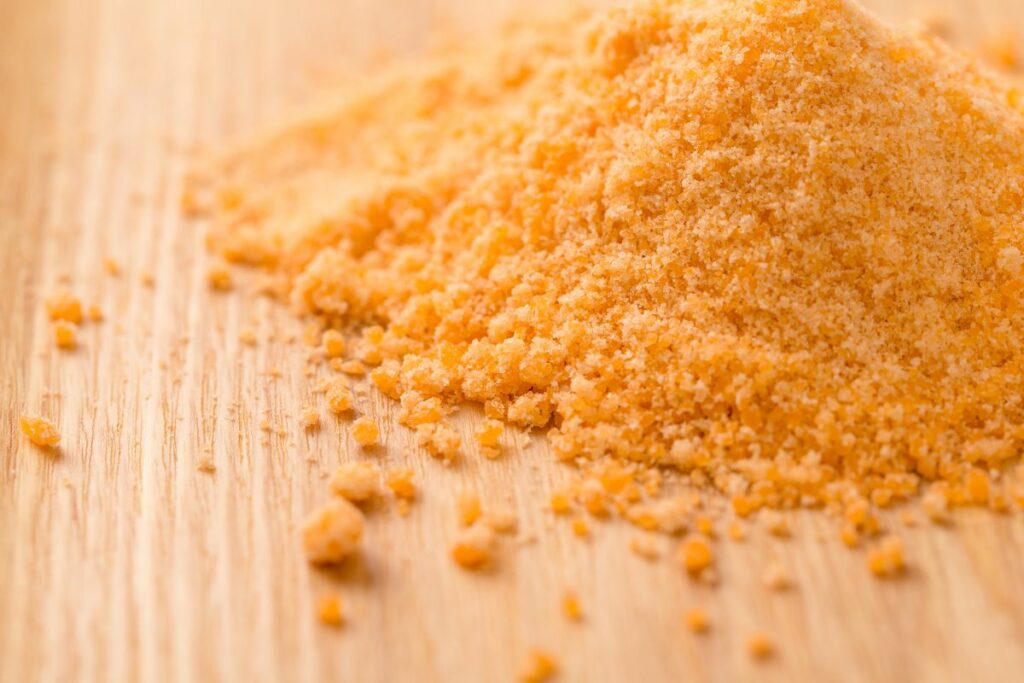
Granulated Sugar
Granulated sugar is the most common type of sugar and is made by refining sugarcane or sugar beets. It is a good substitute for vanilla sugar in recipes that require a neutral flavor. Use it in equal amounts as vanilla sugar.
Coconut Sugar
Coconut sugar is a natural sweetener made from the sap of coconut palms. It has a caramel-like flavor and is a good substitute for vanilla sugar in recipes that require a more complex taste. Use it in equal amounts as vanilla sugar.
Palm Sugar
Palm sugar is a sweetener made from the sap of the Palmyra or sugar palm trees. It has a caramel-like flavor and is a good substitute for vanilla sugar in recipes that require a more complex taste. Use it in equal amounts as vanilla sugar.
White Sugar
White sugar is the most refined form of sugar and is made by removing all impurities from sugarcane or sugar beets. It is a good substitute for vanilla sugar in recipes that require a neutral flavor. Use it in equal amounts as vanilla sugar.
Refined Sugar
Refined sugar is a highly processed form of sugar that has had all of its impurities removed. It is a good substitute for vanilla sugar in recipes that require a neutral flavor. Use it in equal amounts as vanilla sugar.
Icing Sugar
Icing sugar, also known as powdered sugar, is a finely ground sugar that is often used in baking and confectionery. It is a good substitute for vanilla sugar in recipes that require a fine texture. Use it in equal amounts as vanilla sugar.
When using sugar-based substitutes, keep in mind that they may not have the same depth of flavor as vanilla sugar. However, they are still a great option for those looking to avoid using vanilla sugar in their recipes.
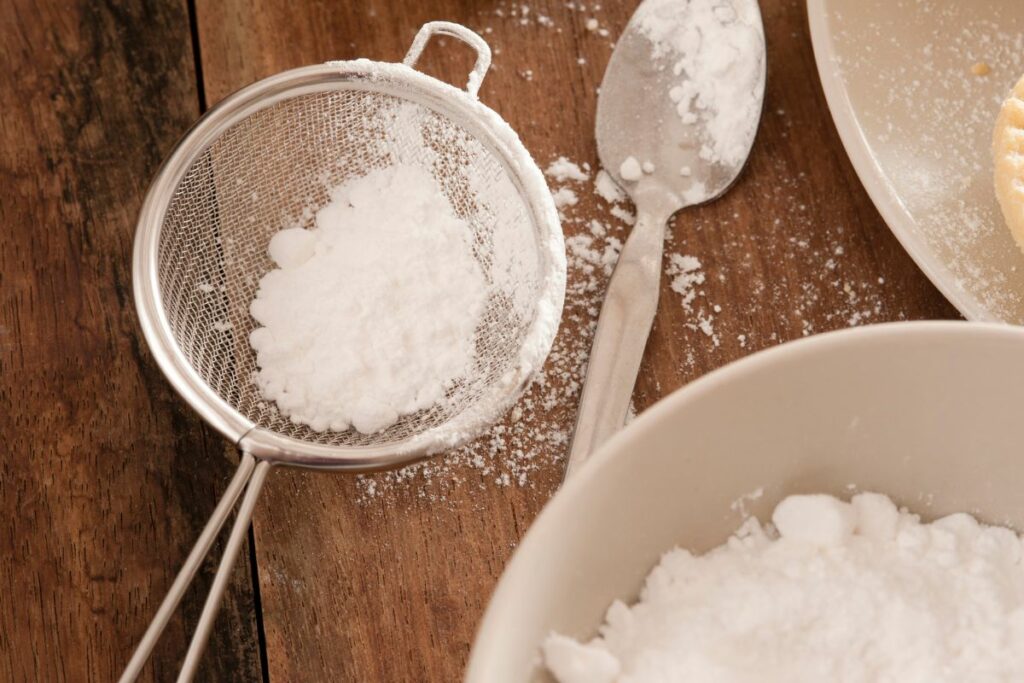
Natural Sweeteners as Substitutes
When it comes to sweetening foods and beverages, many people turn to refined sugar. However, there are many natural sweeteners available that can be used as substitutes. These sweeteners not only add flavor but also provide some health benefits.
Honey
Honey is a natural sweetener that has been used for centuries. It contains antioxidants and has antibacterial properties. Honey is also a good source of energy and can help soothe a sore throat. It can be used as a substitute for sugar in many recipes, including baked goods, dressings, and marinades.
Maple Syrup
Maple syrup is another natural sweetener that can be used as a substitute for sugar. It is made from the sap of maple trees and contains antioxidants and minerals such as manganese and zinc. Maple syrup has a unique flavor that can add depth to many recipes, including pancakes, waffles, and oatmeal.
Molasses
Molasses is a byproduct of the sugar-making process and is a natural sweetener that is high in iron and other minerals. It has a strong flavor and can be used as a substitute for sugar in recipes such as gingerbread and baked beans.
Monk Fruit Sweetener
Monk fruit sweetener is a natural sweetener that is made from the extract of the monk fruit. It is low in calories and does not raise blood sugar levels, making it a good option for people with diabetes. Monk fruit sweetener can be used as a substitute for sugar in many recipes, including beverages, sauces, and baked goods.
Fruits and Vegetables
Fruits and vegetables are also natural sweeteners that can be used as substitutes for sugar. They contain natural sugars and are high in vitamins and minerals. Some examples of fruits and vegetables that can be used as sweeteners include bananas, dates, sweet potatoes, and applesauce.
Overall, natural sweeteners can be a healthier alternative to refined sugar. They add flavor and provide some health benefits, making them a great addition to any recipe.
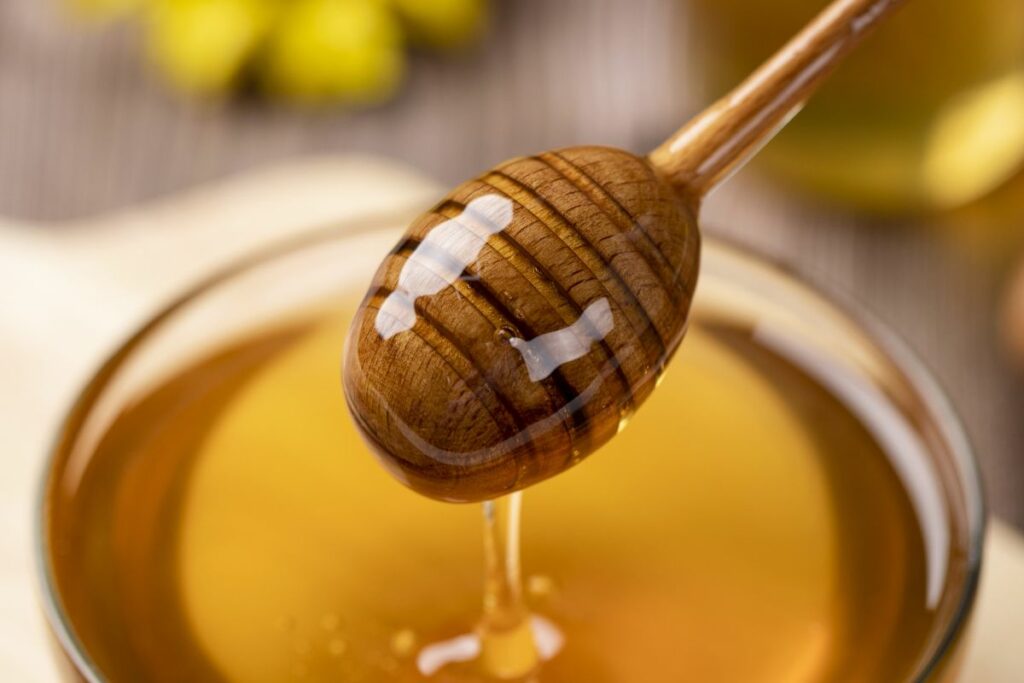
Artificial Sweeteners as Substitutes
Artificial sweeteners are sugar substitutes that are used to sweeten food and drinks while providing fewer calories than sugar. They are often used by people who want to reduce their calorie intake or manage their blood sugar levels. Some popular artificial sweeteners include aspartame, sucralose, and xylitol.
Aspartame is a low-calorie sweetener that is commonly used in diet sodas, chewing gum, and other sugar-free products. It is made up of two amino acids, phenylalanine and aspartic acid, and is about 200 times sweeter than sugar. While aspartame is generally considered safe, some people may experience side effects such as headaches or dizziness.
Sucralose is a no-calorie sweetener that is derived from sugar. It is about 600 times sweeter than sugar and is commonly used in diet drinks, baked goods, and other sugar-free products. Sucralose is generally considered safe and does not have any known side effects.
Xylitol is a sugar alcohol that is commonly used as a sweetener in sugar-free gum and other products. It has about the same sweetness as sugar but provides fewer calories. Xylitol is also known to have dental benefits, as it can help prevent tooth decay. However, consuming too much xylitol can cause digestive issues such as bloating or diarrhea.
Sugar alcohols are a type of sweetener that are commonly used in sugar-free candies, gum, and other products. They are often used as a sugar substitute because they provide fewer calories and do not raise blood sugar levels as much as sugar. However, sugar alcohols can cause digestive issues such as bloating or diarrhea if consumed in large amounts.
Overall, artificial sweeteners can be a good option for people who want to reduce their calorie intake or manage their blood sugar levels. However, it is important to use them in moderation and be aware of any potential side effects.
How to Use Vanilla Sugar Substitutes
Vanilla sugar substitutes are a great option for those who want to add a touch of vanilla flavor to their recipes without using vanilla sugar. Here are some tips on how to use vanilla sugar substitutes in your cooking and baking:
Baked Goods and Pastries
When making baked goods or pastries, you can use vanilla sugar substitutes in place of regular sugar. For example, if a recipe calls for 1 cup of sugar, you can replace it with 1 cup of vanilla sugar substitute. This will give your baked goods a subtle vanilla flavor.
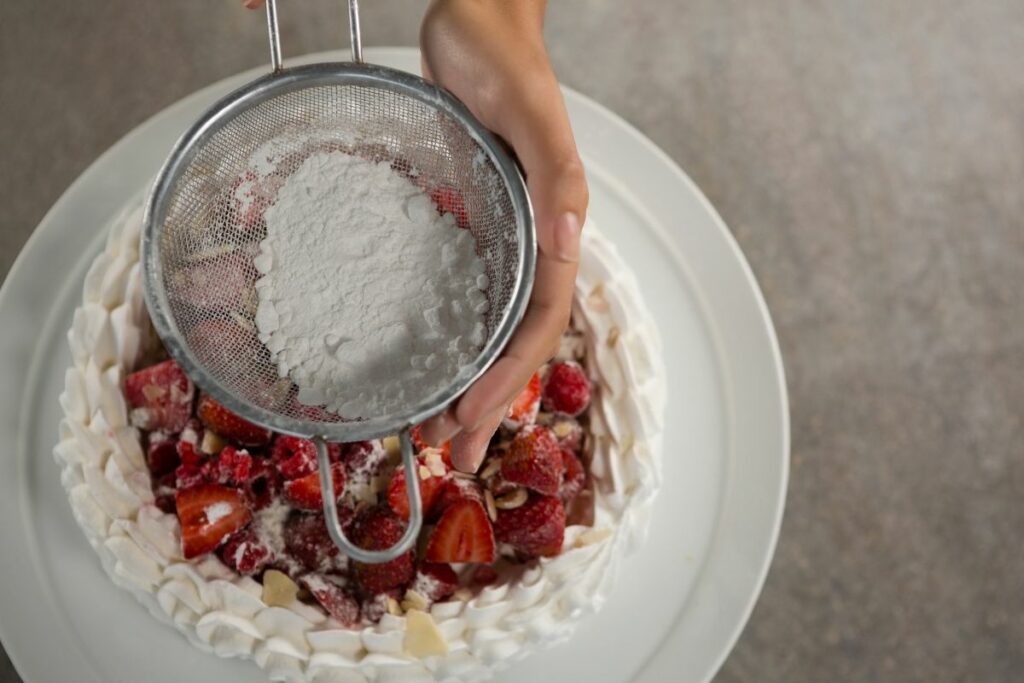
Cake and Cookie Dough
When making cake or cookie dough, you can add a teaspoon of vanilla extract to the recipe to give it a vanilla flavor. If you don’t have vanilla extract, you can use vanilla sugar substitute instead. Simply add 1 teaspoon of vanilla sugar substitute for every cup of sugar called for in the recipe.
Coffee and Tea
If you like to add sugar to your coffee or tea, you can use vanilla sugar substitute instead of regular sugar. This will give your beverage a hint of vanilla flavor.
Icings and Frostings
When making icings or frostings, you can use vanilla sugar substitute in place of regular sugar. Simply add the vanilla sugar substitute to the recipe as you would regular sugar. This will give your icing or frosting a subtle vanilla flavor.
Sauces
When making sauces, you can use vanilla sugar substitute instead of regular sugar. This will give your sauce a hint of vanilla flavor. Simply add the vanilla sugar substitute to the recipe as you would regular sugar.
Ice Cream and Beverages
When making ice cream or other beverages, you can use vanilla sugar substitute instead of regular sugar. This will give your ice cream or beverage a subtle vanilla flavor. Simply add the vanilla sugar substitute to the recipe as you would regular sugar.
Overall, vanilla sugar substitutes are a great way to add a touch of vanilla flavor to your recipes. Whether you’re making baked goods, sauces, or beverages, there are many ways to use vanilla sugar substitutes.
Effects on Taste and Texture
Vanilla sugar substitutes can have a significant impact on the taste and texture of baked goods and other sweet treats. While natural vanilla extract is known for its rich, complex flavor and aroma, many vanilla sugar substitutes are designed to provide a similar taste without the added calories and sugar.
One of the primary benefits of using a vanilla sugar substitute is that it can help to reduce the overall sweetness of a recipe. This can be especially helpful for those who are looking to cut back on sugar or who are following a low-carb or keto diet. By using a sugar substitute instead of traditional sugar, it is possible to create a dessert that is still sweet and satisfying, but without the added calories and carbs.
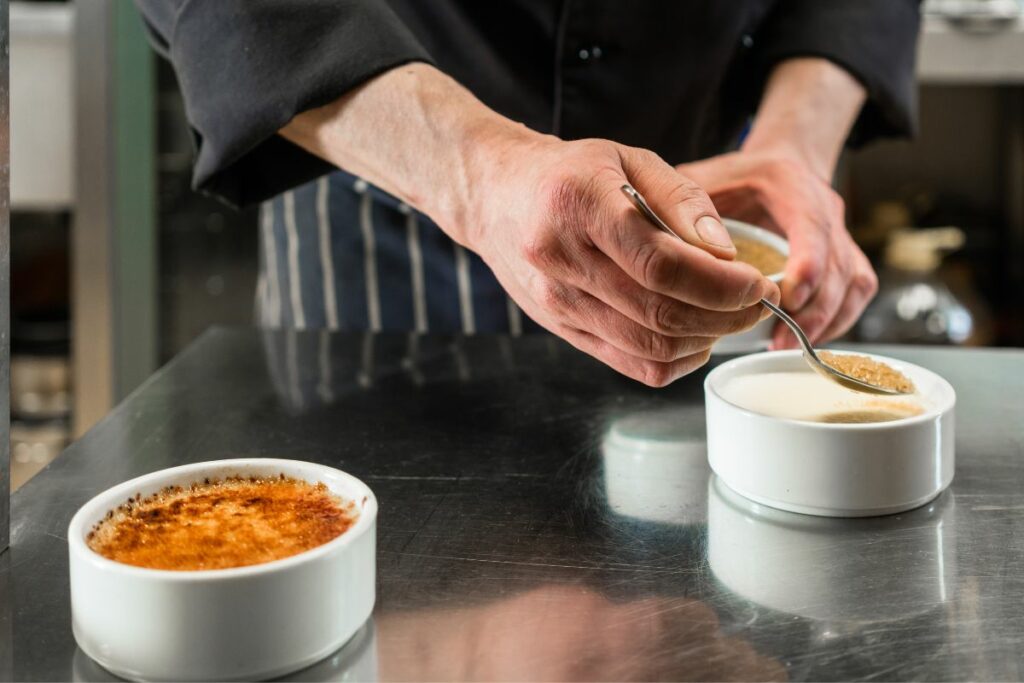
In addition to its impact on sweetness, vanilla sugar substitutes can also have an effect on the texture of baked goods. Some substitutes, such as erythritol, can create a slightly grainy texture that some people find unappealing. Others, such as allulose, can help to create a smooth, creamy texture that is similar to traditional sugar.
Another factor to consider when using a vanilla sugar substitute is its impact on the flavor of the dessert. Some substitutes, such as monk fruit extract, can create a slightly caramel taste that can be a welcome addition to certain recipes. Others, such as stevia, can have a slightly bitter aftertaste that some people find unpleasant.
Overall, the effects of using a vanilla sugar substitute on taste and texture can vary depending on the specific type of substitute used and the recipe being made. However, by experimenting with different substitutes and recipes, it is possible to create delicious desserts that are both healthy and satisfying.
Making Your Own Vanilla Sugar Substitute
If you can’t find vanilla sugar at the store or prefer to make your own, it’s easy to create a homemade vanilla sugar substitute using just two ingredients: vanilla beans and granulated sugar. Making your own vanilla sugar substitute allows you to control the quality of the ingredients and customize the flavor to your liking.
Ingredients
To make your own vanilla sugar substitute, you will need:
- Vanilla beans: You can use either whole vanilla beans or vanilla bean paste. Whole vanilla beans are more expensive but provide a stronger and more authentic vanilla flavor. Vanilla bean paste is a convenient alternative that is easier to measure and use than whole vanilla beans.
Granulated sugar: You can use any type of granulated sugar, such as white sugar, raw sugar, or organic sugar. The quality of the sugar will affect the flavor of the vanilla sugar substitute, so it’s best to use a high-quality sugar for the best results.
Instructions
To make your own vanilla sugar substitute, follow these simple steps:
- Cut the vanilla beans lengthwise and scrape out the seeds using a knife or the back of a spoon. Reserve the seeds for later use.
- Add the scraped vanilla bean pods and the sugar to a blender or food processor and blend until the vanilla bean pods are finely ground and evenly distributed throughout the sugar.
- Transfer the vanilla sugar to a jar or airtight container and add the reserved vanilla seeds. Shake the jar or container well to distribute the seeds evenly throughout the sugar.
- Store the vanilla sugar substitute in a cool, dry place for up to several months. The longer the vanilla sugar sits, the more intense the flavor will become.

Substitutes
If you don’t have vanilla beans or prefer not to use them, there are several other vanilla sugar substitutes you can try, such as:
- Vanilla extract: You can substitute 1 teaspoon of vanilla extract for 1 tablespoon of vanilla sugar in most recipes. Keep in mind that vanilla extract contains alcohol and may not provide the same flavor as vanilla sugar.
- Vanilla-infused sugar: You can infuse granulated sugar with vanilla beans by adding a split vanilla bean pod to a jar of sugar and letting it sit for several days to several weeks. The longer the vanilla bean sits in the sugar, the stronger the flavor will become.
- Vanilla-flavored sweetener: You can use a vanilla-flavored sweetener, such as stevia or monk fruit sweetener, as a natural and calorie-free alternative to vanilla sugar. To make your own vanilla-flavored sweetener, add a split vanilla bean pod to a jar of sweetener and let it sit for several days to several weeks.
Other Uses of Vanilla Sugar Substitutes
Vanilla sugar substitutes are not just limited to baking. They can be used in a variety of ways to add a touch of vanilla flavor to your favorite dishes and drinks. Here are some other uses of vanilla sugar substitutes:
Sprinkle
Vanilla sugar substitutes can be used as a sprinkle on top of your favorite desserts, such as ice cream, fruit salad, or yogurt. Just a small amount can add a sweet vanilla flavor to your dish.
Simple Syrup
Vanilla sugar substitutes can be used to make a vanilla-flavored simple syrup. This can be used to sweeten cocktails, lemonade, or iced tea. To make vanilla simple syrup, mix equal parts of water and vanilla sugar substitute in a saucepan and heat until the sugar is dissolved.
Finishing Sugar
Vanilla sugar substitutes can be used as a finishing sugar for baked goods. Just sprinkle some on top of your muffins, scones, or French toast before serving for a sweet and delicious touch.
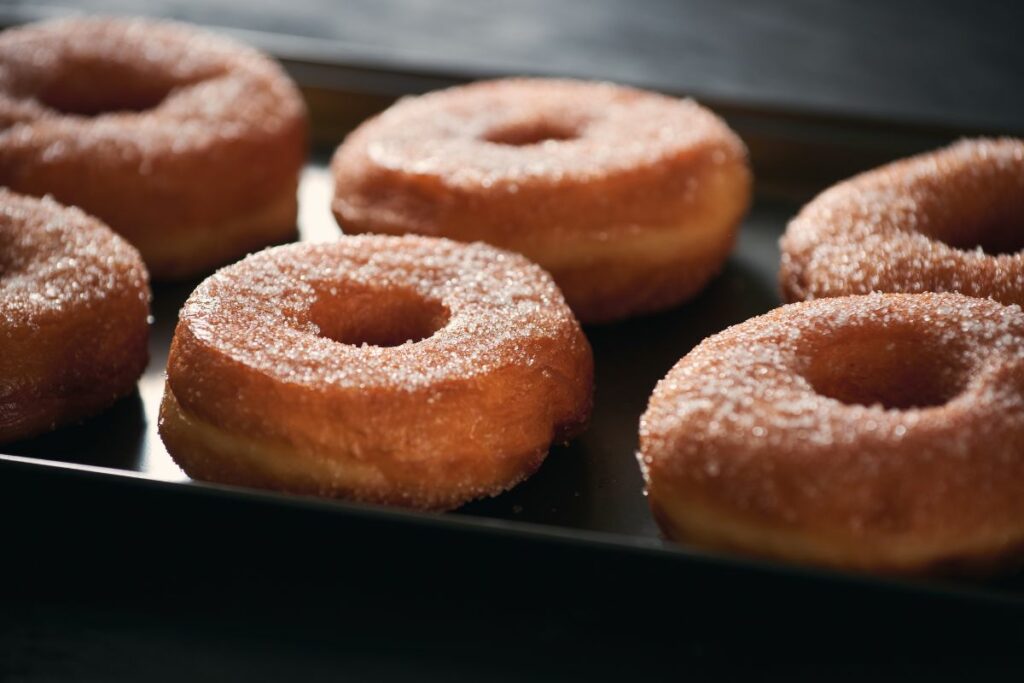
Cocktails
Vanilla sugar substitutes can be used to sweeten cocktails. They work particularly well in creamy cocktails, such as White Russians or Mudslides. Just mix the vanilla sugar substitute with your favorite liquor and cream for a delicious drink.
Candy
Vanilla sugar substitutes can be used to make vanilla-flavored candy. They work particularly well in fudge and caramels. Just substitute the regular sugar in your recipe with vanilla sugar substitute for a sweet and flavorful candy.
Oatmeal
Vanilla sugar substitutes can be used to sweeten oatmeal. Just mix the vanilla sugar substitute with your oatmeal and milk before cooking for a delicious and flavorful breakfast.
Spice
Vanilla sugar substitutes can be used as a spice in savory dishes. They work particularly well in marinades for chicken or pork. Just mix the vanilla sugar substitute with soy sauce, garlic, and ginger for a delicious and flavorful marinade.
Vanillin
Vanilla sugar substitutes contain vanillin, which is the chemical compound responsible for the vanilla flavor. Vanillin has been shown to have antioxidant and anti-inflammatory properties. It may also have potential benefits for heart health and diabetes management. However, more research is needed to confirm these potential benefits.
Overall, vanilla sugar substitutes are a versatile ingredient that can be used in a variety of ways to add a sweet and delicious vanilla flavor to your favorite dishes and drinks.
